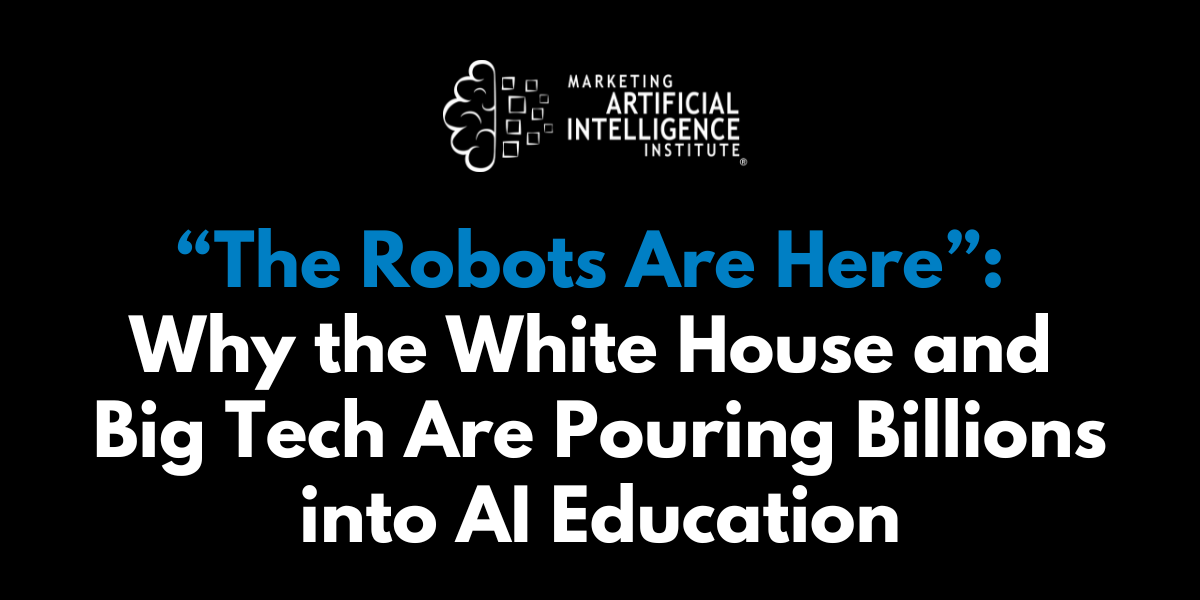The US government is sending a clear message: AI literacy is a national priority.
At a recent White House event, the administration, led by First Lady Melania Trump, declared that teaching AI in schools is essential to America's future, stating that "the robots are here" and our future is no longer science fiction. This event brought together top tech leaders, including those from OpenAI, Google, and Microsoft, to announce major commitments aimed at integrating AI into the education system.
It’s pretty clear from the event that the government views AI not as a job-killer to be feared, but as a competitive necessity—and that students must prepare for an economy reshaped by automation.
To understand what it all means for businesses and the workforce, I spoke with SmarterX and Marketing AI Institute founder and CEO Paul Roetzer on Episode 166 of The Artificial Intelligence Show.
The Tech Giants Step Up
At the White House event, tech companies showcased their new initiatives, backing up the administration's stance with significant resources.
- OpenAI talked up its plans for a new jobs platform and a goal of certifying 10 million Americans in AI skills by 2030.
- Google's CEO Sundar Pichai committed to providing its Gemini for Education platform to every U.S. high school. Google has also pledged over $1 billion for job training and education programs over the next three years, with $150 million specifically earmarked for AI education and digital wellbeing.
- Microsoft's Vice Chair Brad Smith and LinkedIn CEO Ryan Roslansky announced free Copilot access for college students, new AI courses on LinkedIn Learning, and $1.25 million in grants for educators leading the way in AI-powered learning.
Roetzer highlighted the sheer star power at a dinner following the event. The guest list included a who's who of tech royalty, like Mark Zuckerberg, Bill Gates, Tim Cook, and Satya Nadella, all convened to support the administration's AI agenda.
The dinner wasn’t without its share of drama, though. Zuckerberg was called on by President Trump to share how much Meta planned to invest in the US. Zuckerberg said Meta was prepared to invest up to $600 billion. But then he got caught on a hot mic telling the President: “Sorry, I wasn’t ready…I wasn’t sure what number you wanted to go with.”
Roetzer noted that this moment underscores the performative nature of such events. However, he emphasized that what really matters is the action behind the words.
“Look at what they’re actually doing, not what they’re saying,” he says. “And what they're doing is preparing the economy for a very, very different look in the next couple years.”
The Unspoken Reason: Preparing for Massive Disruption
While the public message is about enhancing learning and preparing for the future, the underlying motivation is a clear acknowledgment of impending workforce disruption. As Roetzer explains, political leaders and tech executives can't openly admit that AI will lead to mass job displacement, but their actions speak volumes.
"They're not going to be straightforward and say, 'Hey, jobs are gonna get massively disrupted,'" he says. "But they're not doing everything they're doing unless they believe that.”
This proactive push for AI literacy is a response to the rapid pace of change. It's an effort to reskill and upskill the population for a new economy where AI will take on tasks that humans once performed.
It's a step that Roetzer and other experts have been calling for, and he's glad to see it happening.
“It’s what needed to happen,” he says. “These companies are making hundreds of billions, potentially trillions, of dollars. They have to turn around and support workers and the economy.”
The Takeaway
The government's new AI education initiatives are a powerful signal that the U.S. is not only embracing AI but actively preparing its workforce for a radically different future.
By getting tech leaders on board and dedicating billions to AI literacy, the administration is moving beyond rhetoric and into action. The “robots are here," and the nation’s top leaders—in both government and the tech industry—are finally trying to make sure we're ready for what comes next.
Mike Kaput
Mike Kaput is the Chief Content Officer at SmarterX and a leading voice on the application of AI in business. He is the co-author of Marketing Artificial Intelligence and co-host of The Artificial Intelligence Show podcast.


